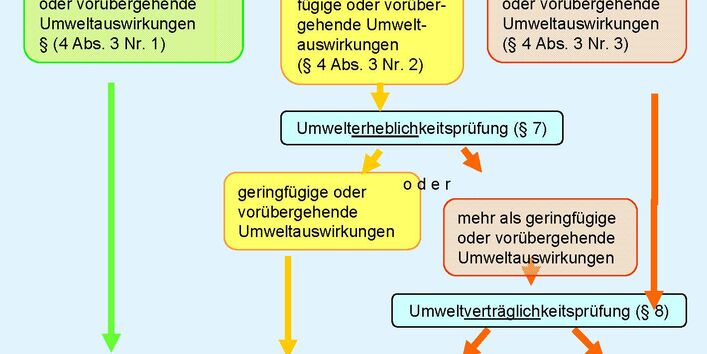Article 3 AIEP designates the Federal Environment Agency in Dessau-Roßlau as the national Competent Authority for activities in the Antarctic. When an application to carry out an activity in the Antarctic is submitted to the UBA, Agency staff examines documents whether the activity gives cause to suspect
- less than a minor or transitory impact,
- minor or transitory impact, or
- more than a minor or transitory impact
on the assets to be protected in the Antarctic set forth in the AIEP. The permit of an activity in the Antarctic as per AIEP follows a set procedure (see diagram below).
Category I
If UBA determines that the planned activity is likely to cause "less than a minor and transitory impact" on assets to be protected, it usually issues a permit within six weeks.
Category II
If the UBA determines that the planned activity will likely cause "at least a minor or transitory" impact, it classifies as a Category II activity which automatically involves an Initial Environmental Evaluation (IEE). The IEE is usually based on the applicant's own Initial Environmental Study (IES). The legislator gives applicants the opportunity in the IES to outline the project in detail, in addition to the summary submitted on the questionnaire. Details of activities, advantages and disadvantages, alternatives and other considerations are explained in more detail here. This procedure aims to ensure that the applicant has another opportunity to explain the activity in detail and that the Competent Authority has sufficient information on which to base and reach a final decision on the planned activity. The most important content requirements of an IES are outlined in AIEP. The national Competent Authority examines the submitted IES to determine if a planned activity may have a "minor or transitory impact only" or "more than a minor or transitory" environmental impact.
Category III
If the UBA as national Competent Authority determines that the planned activity is likely to cause "more than a minor or transitory impact", Section 8 AIEP stipulates that it must request a Comprehensive Environmental Study (CES) and carry out a Comprehensive Environmental Evaluation (CEE). This involves the cooperation of the other Consultative Parties and the Committee for Environmental Protection. The procedure can therefore take as long as 16 months. Any possible provisos or conditions for gaining a permit are based on relevant sections of the AIEP and opinions of the stakeholder institutions and states party to the treaty.
The UBA has done a large number of Initial Environmental Evaluations (IEE) since the Act Implementing the Environmental Protection Protocol entered into force.
Only two Comprehensive Environmental Evaluations (CEEs) have been carried out up to now, the first for the European Project for Ice Coring in Antarctica (EPICA), and the second to evaluate the construction and operation of the planned Neumayer III wintering station and the dismantling of the Neumayer Station II. All the corresponding documentation are open documents:
- Comprehensive Environmental Evaluation
- UBA permit
- and AWI comprehensive environmental study (in German)
Permits issued by UBA for non-scientific activities are subject to a charge in accordance with the “Cost ordinance for official acts under the Act Implementing the Protocol on Environmental Protection to the Antarctic Treaty” of 22 September 1994 (ANTKostV). The ordinance entered into force upon publication in the Federal Gazette on 15 May 2001.
